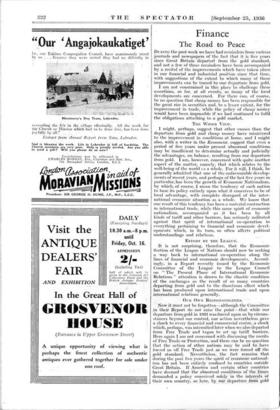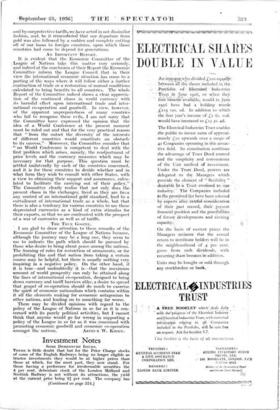Finance
The Road to Peace
DuRnqo the past week we have had reminders from various journals and newspapers of the fact that it is five years ' since Great Britain departed from the gold standard, and not a few of these reminders have been accompanied by a recital of the improvements which have taken place in our financial and industrial position since that time, with suggestions of' the extent to which many of these improvements can be traced to our departure from gold. I am not constrained in this place to challenge these assertions, so far, at all events, as many of the loCal developments are concerned. For there can, of course, be no question that cheap money has been reSponsible for the great rise in securities and, to a lesser extent, for the improvement in trade,--while the policy of cheap-inoitey would have been impossible if we had continued to fulfil the obligations attaching to a gold market.
THE WIDER VIEW.
I might, perhaps, suggest that other causes than the departure. from gold and cheap money have ministered to the improvement in conditions at home, and I might also, with a writer in .the Economist, suggest that even a period of five years under present abnormal conditions may be insufficient to determine actually and judicially the advantages, on balance, resulting from our departure from gold. I am, however, concerned with quite another aspect of the matter, namely, that which relates to the well-being of the world ES a whole. For it, will, I think, be generally admitted- that one of the unfavourable develop- ments of recent years, and perhaps of the last five years in particular, has been the growth of Economic Nationalism, by which, of course, I mean the tendency of each nation to base its policy entirely upon what it conceives to be of local advantage, with complete disregard of the inter- national economic situation as a whole. We know that one result of this tendency has been a material contraction in international trade, while. this same spirit of economic nationalism, accompanied as .it has been by all kinds of tariff and other barriers, has. seriously militated against that spirit of . international co-operation in everything pertaining to financial and economic devel- opments which, in its turn, so often affects, ,political understandings and relations.
EFFORT BY THE LEAGUE.
It is not surprising, therefore, that the Economic Section of the League of Nations should now be seeking a -way back to international co-operation along the lines-of. financial and economic developments. Accord- ingly, in a Report recently issued by the Economic Committee of the League to the League Council on " The Present Phase of- International -Economic Relations " attention is drawn to the chaotic condition of the exchanges as the result of so many. countries departing from gold and to the disastrous effect which has been produced upon international trade and upon international relations generally.
OUR OWN RESPONSIBILITIES; .'-` NOW it must not be forgotten—although the Committee in their Report do .not raise the point----that while Our departure from gold iri 1931 was forced upon us `by circum- stances beyond our control, our action nevertheless gave a shock to every financial and commercial centre, a shock which, perhaps, was intensified later when we alg6 departed from Free Trade and began to set. up tariff barriers. Here again I am not concerned with discussing the merits of Free Trade-or 'Protection,-and there can be no question that the action of other nations may be said to have forced .us off Free Trade just as we were forced off the gold standard. Nevertheless, the fact remains that during the past five years the spirit of econbrnie national- ism has not been entirely confined to countries outside Great Britain. If A-m'erica and certain Other countries have deemed that the abnormal conditions of the ;times demanded a policy conceived solely in the interests_ of their own country, so here, by our .departure from' gold and by our protective tariffs, wo.have acted in not dissimilar fashion, and, be it renieinfided that our departure from gold was also followed by a sudden and complete cutting off of our loans- to foreign countries, • upon which those countries had come to depend for generations.
AN IMPORTANT REPORT.
It is evident that the Econoinic Committee of the IJeague of Nations take this . matter very serionsly, and indeed at the conclusion of their Report the_ Economic _Committee inform the League Council_ that.. in their view the international .econOmic situation has come to .a parting of the ways where it will follow either a further _contraction of trade or a restoration of normal conditions :.calculated to bring benefits to all countries. The whole Report of the Committee indeed shows a clear apprecia- tion . of the continued .chaos in world currency, with its harmful effect upon international trade and . inter- national co-operation and goodwill. In view, however, :of the apparent unpreparedness of many countries who fail to recognise. these I am not . sorry that the Committee have expressed the opinion that the idea of a World Conference at the present moment . must be ruled out and that for the very practical reason that -" from the outset the diversity of the interests of different countries would constitute an obstacle -to its success•27- Moreover, the Committee consider that no World COnferences is competent to deal with the 'first-Problern which arises, namely, the readjustment of price 'levels and the currency meastires which may be -necessary for that purpose. This qtiestion must be ..ettied unilaterally by each of the countries concerned, and it is for these countries to decide whether and in *hat form they wish' to consult' with 'Other States, with 'a view to obtaining-their support and assurances, calcu- lated to facilitate the carrying out "Of their policy." 'The Committee clearly realise that riot only does the present chaos in the ekchanges; freed as they are from any control of an international gold- standard, lead tO'a 'curtailment of international trade as a 'whole, but that there is also a tendency for various countries to use these depreciated currencies as a- 'kind of extra stimulus for -their exports, so that we are confronted with the prospect 'of a war of currencies as Well as of tariffs.
THE TRUE GOSPEL.
I amglad to draw attention to these, remarks of the Economic Committee of the League of Nations because, although the journey may be a long one, they seem to me to indicate the path which should be pursued by those who desire to bring about peace among the nations. The framing of rules for restriction of armaments, or for prohibiting this and that 'nation from taking a certain course may be helpful, but there is usually nothing very inspiring in a negative policy.- On the other hand, '-if it is true—and undoubtedly it is—that the maximum amount 'of -world prosperity can only be attained along the lines of international co-operation, designed to bring down currency and tariff barriers alike, a desire to spread that gospel of co-operation should do much to exorcize the spirit of economic nationalism' which contains within it all the elements making for economic antagonism to other nations, and leading on to something far worse.
There may be divided opinions with regard to the Policy of the League of -Nations in so far as it is con- cerned with its purely political activities, but I cannot think that anyone- would go far wrong in supporting a policy of the League in so far as it was concerned with promoting economic goodwill and economic co-operatiOn



















































 Previous page
Previous page